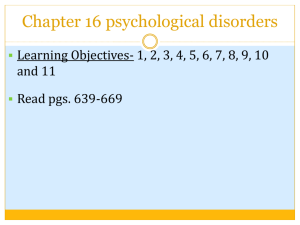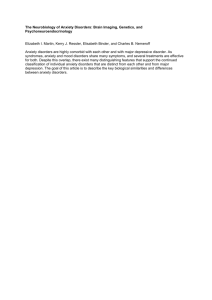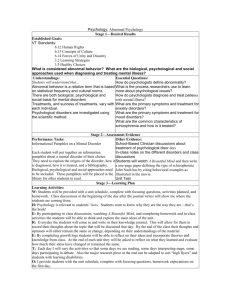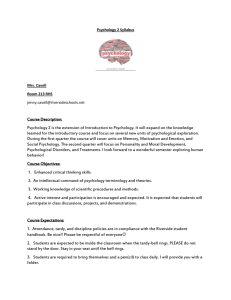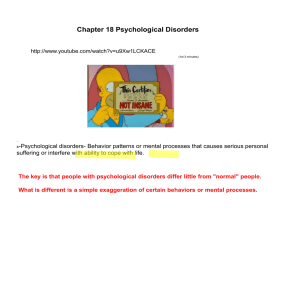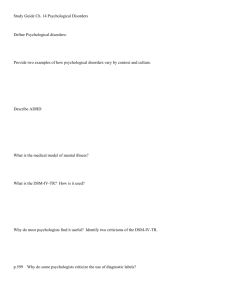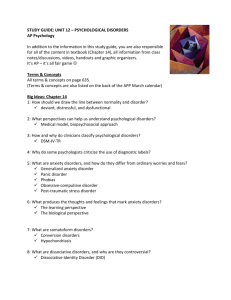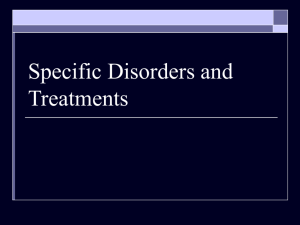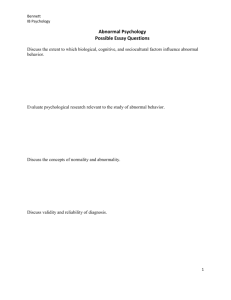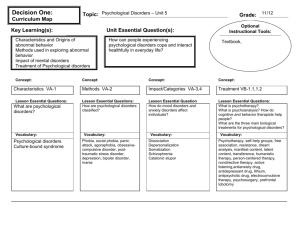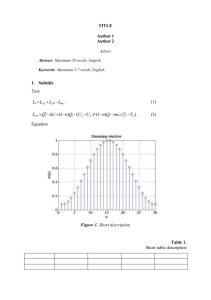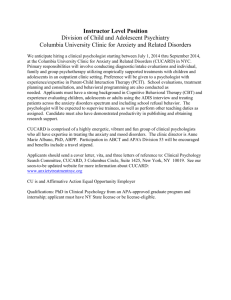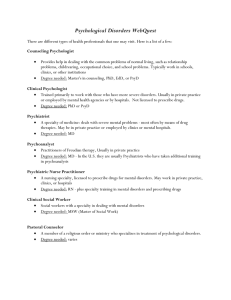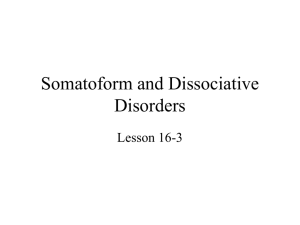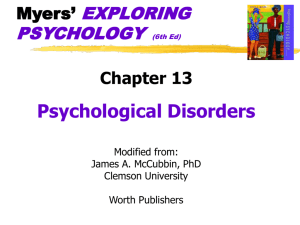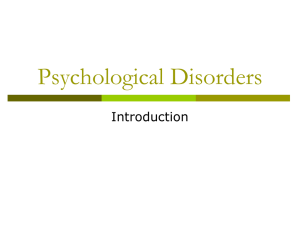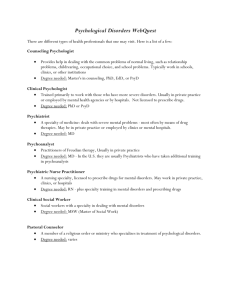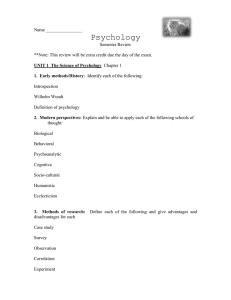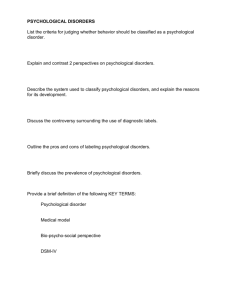Psychology CP Final Study Guide Directions: For the following terms
advertisement
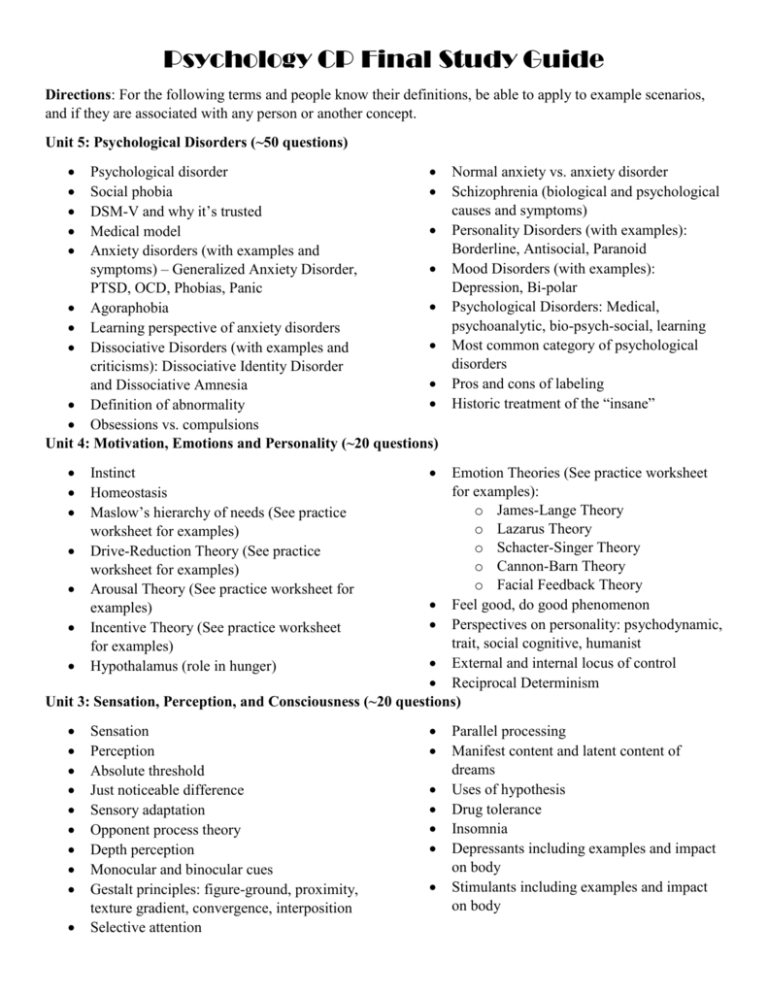
Psychology CP Final Study Guide Directions: For the following terms and people know their definitions, be able to apply to example scenarios, and if they are associated with any person or another concept. Unit 5: Psychological Disorders (~50 questions) Psychological disorder Social phobia DSM-V and why it’s trusted Medical model Anxiety disorders (with examples and symptoms) – Generalized Anxiety Disorder, PTSD, OCD, Phobias, Panic Agoraphobia Learning perspective of anxiety disorders Dissociative Disorders (with examples and criticisms): Dissociative Identity Disorder and Dissociative Amnesia Definition of abnormality Obsessions vs. compulsions Unit 4: Motivation, Emotions and Personality (~20 questions) Instinct Homeostasis Maslow’s hierarchy of needs (See practice worksheet for examples) Drive-Reduction Theory (See practice worksheet for examples) Arousal Theory (See practice worksheet for examples) Incentive Theory (See practice worksheet for examples) Hypothalamus (role in hunger) Sensation Perception Absolute threshold Just noticeable difference Sensory adaptation Opponent process theory Depth perception Monocular and binocular cues Gestalt principles: figure-ground, proximity, texture gradient, convergence, interposition Selective attention Normal anxiety vs. anxiety disorder Schizophrenia (biological and psychological causes and symptoms) Personality Disorders (with examples): Borderline, Antisocial, Paranoid Mood Disorders (with examples): Depression, Bi-polar Psychological Disorders: Medical, psychoanalytic, bio-psych-social, learning Most common category of psychological disorders Pros and cons of labeling Historic treatment of the “insane” Emotion Theories (See practice worksheet for examples): o James-Lange Theory o Lazarus Theory o Schacter-Singer Theory o Cannon-Barn Theory o Facial Feedback Theory Feel good, do good phenomenon Perspectives on personality: psychodynamic, trait, social cognitive, humanist External and internal locus of control Reciprocal Determinism Unit 3: Sensation, Perception, and Consciousness (~20 questions) Parallel processing Manifest content and latent content of dreams Uses of hypothesis Drug tolerance Insomnia Depressants including examples and impact on body Stimulants including examples and impact on body Hallucinogens including examples and impact on body Unit 2: Learning and Cognition (~20 questions) Learning Associative learning Ivan Pavlov and his discovery of classical conditioning o Unconditioned stimulus o Unconditioned response o Conditioned stimulus o Conditioned response Generalization Acquisition Discrimination (as it relates to classical conditioning) B.F. Skinner and operant conditioning (Skinner’s box) o Positive and negative reinforcement o Positive and negative punishment John B. Watson and Little Albert Observational learning Memory – encoding, storage, retrieval Short and long term memory Noam Chomsky and his theory of language acquisition Edward Thorndike Albert Bandura and the BoBo Dolls Unit 1: History/perspectives, Nature v. Nurture, and Development (~10 questions) Psychology Goals of psychology Nature debate Nurture debate Piaget Stages of development – be able to identify the name or age of each stage and it’s description Kohlberg’s Stages of Moral Development be able to identify the name or age of each stage and it’s description Erikson’s Stages of Development - be able to identify the name or age of each stage and it’s description Freud’s Stages of Development - be able to identify the name or age of each stage and it’s description Object permanence Egocentrism Parenting Styles (three main types) Stages of grief


